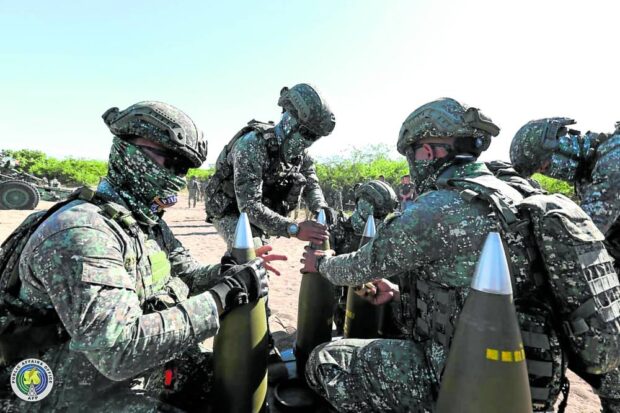
DEFENSIVE READINESS | Members of the Philippine Marines prepare artillery rounds during Wednesday’s Ajex-Dagitpa exercises with other branches of the military on the coast of Burgos town in Ilocos Norte. (Photo from the Armed Forces of the Philippines)
BURGOS, Ilocos Norte, Philippines — Troops from different units of the Armed Forces of the Philippines on Wednesday staged live-fire exercises on the coast of Ilocos Norte, near the country’s northwestern tip, simulating defensive action against “an aggressor coming from the sea.”
Artillery fire roared across the Camp Cape Bojeador military reservation in the coastal municipality of Burgos, a town in President Marcos’ home province and facing both the West Philippine Sea and Taiwan, where China has increasingly been showing aggressive conduct.
‘Dagat-Langit-Lupa’
“If they come close to our shores, you will be in the front lines to defend the country. We will prevent them from coming into our land. We should stop them,” AFP chief Gen. Romeo Brawner Jr. told the troops after the drills, without referring who is the aggressor. The exercises are part of the ongoing Joint Exercises “Dagat-Langit-Lupa” (Ajex Dagitpa), which the AFP started on Nov. 6 and would wrap up tomorrow. Some 1,500 troops from the Army, Navy, Marines, and Air Force are taking part. (“Dagat,” “langit” and “lupa” translate to sea, sky, and land in Filipino).
READ: AFP’s future joint drills to utilize new assets for ‘muscle memory’
Wednesday’s drills saw the use of the autonomous truck-mounted howitzer system (Atmos) 155mm self-propelled guns which the Army has newly acquired from Israel, as well as the close air support aircraft AW-109 helicopters and the A-29B light attack plane of the Philippine Air Force.
The Marines came to the live-fire drills with their Soltam M-71 towed howitzers. Photo from the Armed Forces of the Philippines)
Overall commander
The Philippine Marine Corps also fired its Soltan M-71 155mm towed howitzers.
A small group from the Philippine Coast Guard (PCG) and the Philippine National Police also took part in the drills. Brawner said that in case of a national emergency, he would serve as commander of the Philippines Joint Task Force, apart from being the AFP chief.
Both the PCG and PNP will be under his command, he added. The ongoing drills are also in preparation for bigger exercises next year, including the “Balikatan” training and maneuvers involving Philippine and US forces, Brawner said.
Col. Michael Logico, Ajex Dagitpa exercise agent, said the live-fire drills were “a demonstration of interoperable capability” between the AFP’s service components.
“If we can’t train together, it’s next to impossible for us to operate together. For as long as we’re used to this and we get to this point this becomes a yearly activity… the more confidence we’ll have with our operating units,” he said at a press conference after the drills.
For the exercise, Logico said, they placed two maritime targets at varying distances west of Ilocos Norte representing “aggressors from the sea” and engaged them with ground-based artillery and air assets.
‘Strategic messaging’
“It is important that we are doing this here in Northern Luzon, particularly because this is one of the areas considered a vital interest to our national security … The terrain itself gives us an added measure of challenge for our operating troops,” he said. “It also adds to our strategic messaging that we are able to do it in Ilocos.”
After the live-fire exercises, Brawner also oversaw the inauguration of a jungle obstacle course built by Filipino and American troops on the 27-hectare military reservation as part of the ongoing bilateral exercises called “Kamandag.”
“It’s an obstacle course (that) can be used by troops, both from the US and the Philippines … But the symbolism of this is that both countries worked together to build something. It could be an obstacle course today; it could be something bigger tomorrow,” the AFP chief said.